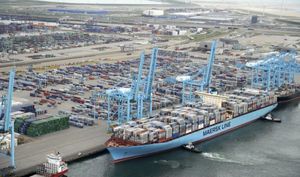Thailand is positioning itself strategically for economic growth by 2025, particularly through its agricultural exports and trade partnerships, according to recent analyses. While facing pressures from global economic fluctuations, the country is aiming to strengthen its presence in key markets, primarily focusing on rice exports and diversifying its product offerings.
Recently, Thai officials led by Commerce Minister Suchat Chomklin have engaged with Senegalese representatives to expand trade relations, particularly boosting rice exports. Senegal, now Thailand's 10th largest trading partner in Africa, has shown increasing interest in Thai rice, with exports to the region seeing significant growth. Last year, Thailand exported approximately 282,367 tons of rice to Senegal, marking a 21.52% increase from the previous year.
This upward trend is supported by Thailand's reputation for high-quality products, particularly jasmine and white rice, unlocking new market opportunities and ensuring food security across regions. Minister Suchat emphasized Thailand's commitment to quality, stating, "We are prepared to provide quality rice to Senegal, particularly jasmine rice, which is entering market phases at favorable prices."
One noteworthy aspect of Thailand's economic outlook involves the collaboration with countries like Bangladesh, where rice imports remain necessary to stabilize local markets. Bangladeshi officials recently confirmed importing rice from Thailand, India, and Vietnam to meet rising domestic demands, reflecting Thailand's strategic role on the regional stage. The ability to remain responsive to import needs reinforces Thailand's agricultural sector's robustness.
Looking to the future, the Thai government has committed to enhancing production capabilities and product diversification. Companies are set to tap new market segments, particularly healthy snacks and rice-based products, responding to changing consumer trends. Notably, the 'Chao' food industry plans to launch between 15-20 new products this year, aiming to capture the growing health-conscious market.
This initiative is mirrored in Thailand's broader strategy to boost its export market through innovation and leveraging existing partnerships. The country is focusing on trade missions to introduce its products at international exhibitions, which has proven effective for amplifying brand presence and securing great deals.
With the anticipated increase of trade volume with Africa and the establishment of joint ventures for penetrating North American markets, Thailand's food sector aims for sustainable growth. The establishment of operations focusing on halal and health-oriented products is also on the agenda. The Thai government estimates the exports could contribute significantly, facilitated by strategies to enter supermarkets across regions.
Nevertheless, economic analysts caution about challenges stemming from global supply chain disruptions and price inflation driven by geopolitical tensions. The rising costs of agricultural inputs play a role as producers adapt to the financial strains of the world market conditions.
Despite these challenges, the sentiment among policymakers remains optimistic, grounded on the country's strong agricultural base and the commitment to fostering trade alliances across Southeast Asia and beyond. Efforts are being made to maintain competitive pricing and assure quality control to solidify Thailand's standing as one of Asia's premier food producers.
With export strategies focusing on quality and diversifying product lines, Thailand aims to project confidence as it navigates the turbulent economic waters leading up to 2025, aspiring to position itself as the regional food hub.
To summarize, Thailand's economic outlook for 2025 is supported by strong agricultural exports, emphasizing quality and diversification. Coupled with strategic trade relations, including those with Senegal and Bangladesh, coupled with proactive governmental policies, Thailand is set to bolster its trade presence internationally. These initiatives not only highlight the country's resilience but also its aspiration to lead the Southeast Asian economic sphere significantly.



